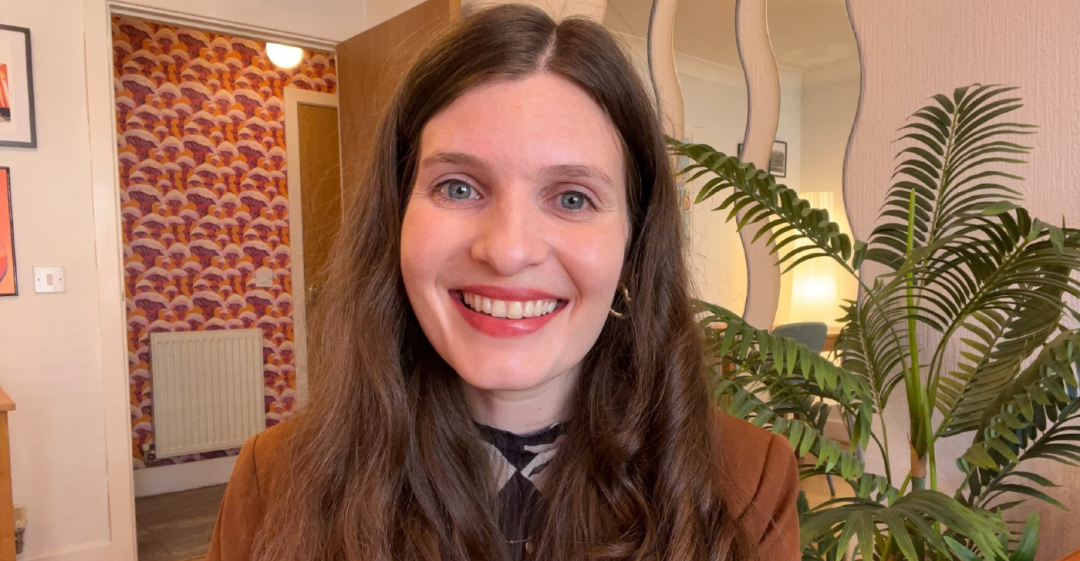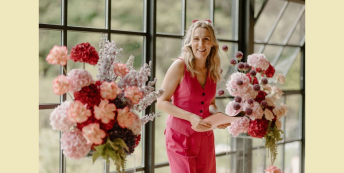“I couldn’t continue working like a robot and feeling utterly burnt out.”

What work were you doing previously?
For almost a decade, I worked as a Content Writer in various brand, communications and marketing teams.
I moved jobs roughly every two years as I never felt happy where I was (a clear sign something isn’t right for you!), so ended up working for a number of companies that sold everything from hotel rooms and appliances to construction tools.
I also worked at a hospice, and my most recent job was at a bus company.
What are you doing now?
I’m now working full-time on my own interior design business, ‘Jessica Power Interiors’.
I offer a consultation service, eDesign (a more affordable option where everything is done online) and Full Service Interior Design — the traditional option where I meet my clients in person and am more involved in the detail of their project.
My main priority is giving my clients exactly what they want, but I’ll also offer some alternative ideas they might not have considered themselves.
It’s a collaborative process and I spend time getting to know my clients so the designs suit their style. I also provide the functionality they need. My job is to remove any stress. I make the process fun and enjoyable!
Why did you change?
I knew the corporate world wasn’t for me.
I felt stifled and like I wasn’t able to show my true personality. It felt too strict and serious. I didn’t enjoy how often colleagues would be reprimanded over seemingly insignificant things.
I also didn’t like that my time wasn’t my own and that most of my life was controlled by my employer. I know this doesn’t bother everyone, but I’ve come to realise that having my freedom is really important to me.
When was the moment you decided to make the change?
I’d just started back at work after the Christmas break and for the first time in the year I’d worked there, it was relatively quiet work-wise.
For the past year, I’d worked at pretty much 100% capacity every day, particularly throughout December when we were super busy with our Christmas campaign.
When January was a little quiet, I thought ‘Ah, this is nice, a couple of weeks without cortisol rushing through my body on a daily basis!’
But I soon realised that working at anything less than 100% capacity wasn’t allowed, despite the company hosting wellbeing workshops every week on the importance of stress management.
That was the final straw for me, realising that no matter how hard you worked, you’d be right back in the firing line the second you were a millimetre short of perfect.
I couldn’t continue working like a robot and feeling utterly burnt out, so then came the lightbulb moment that maybe I should try working for myself instead.
How did you choose your new career?
I’ve loved interior design since I was a child and would Google interior design jobs every so often when I felt fed up.
But it didn’t feel like a realistic option as I didn’t want to / couldn’t afford to go back to uni or start from the bottom on a trainee salary (I have a mortgage and a dog).
But when I came across a course that made this career possible, it’s safe to say I didn’t need any convincing!
Are you happy with the change?
I’m really happy I made the change.
The cloud of misery has lifted. I feel lighter and have gotten my zest for life back! I’m under no illusion that building a business from scratch is easy or stress-free, but once you learn to accept and even embrace uncertainty, it’s an easier feeling to manage than feeling trapped every day.
I’m excited about life again and actually enjoy my daily tasks now. I’m happy to put the hours in because I enjoy it, but it’s also great taking a day off whenever I want to.
What do you miss and what don't you miss?
The most obvious thing I miss is the stable pay cheque and certain perks I got when working for particular companies.
But I don’t miss the stress, the meetings, the tone in which people would talk to me, or being bombarded by Teams messages every day.
Of course there’s an element of that in every job, but some days you just want to turn off the noise and I’m able to do that now.
How did you go about making the shift?
I found a course called the Interior Design Business School which is more of a mentorship.
It teaches you the practical side of running your own interior design business and basically walks you through all the steps you need to take. At the end of the course, you were basically ready to go. All that was left to do was take the leap.
It took me six months to build up the guts, but I eventually quit my job and decided to work on the business full-time.
How did you develop (or transfer) the skills you needed for your new role?
As a writer, I was used to working on briefs daily.
I’m also an extremely detail-oriented person and have a creative mind, so I think the skills I already had were well-suited to interior design.
Of course I had a lot I needed to learn, which the course gave me. From then on, it was all about practice and getting comfortable with many things that were new to me. I will always be learning and practising as I continue to upskill. It’s an ongoing journey.
What didn’t go well? What wrong turns did you take?
I procrastinated a lot in the beginning due to fear, which is common.
It felt like there was so much I needed to do and learn that I was understandably overwhelmed, so I avoided tasks altogether to reduce the friction.
If I’d have ‘eaten the frog’ as they say in the corporate world, I’d have realised that these tasks weren’t actually that bad, and I’d have gotten the ball rolling a lot sooner.
I also think I wasted time because I had savings to fall back on, but the longer I went without an income, the emptier my bank account was. So I wish I’d have procrastinated less and started sooner.
How did you handle your finances to make your shift possible?
I’ve always had savings, but in the lead up to me quitting my job, I tried to rein in my spending so I could save as much as possible.
When I left my job, I had enough money saved to last me around eight months, but that was based on my essential costs only.
In reality, I knew I’d have to spend money on luxuries as I still needed a social life to keep my mental health in check. But I definitely spent a lot more time indoors by myself and only arranged fun things with my friends occasionally.
Luckily for me, my business didn’t require too many start-up costs. All I needed was a laptop, insurance, business cards and some programme subscriptions, so it was less of a financial burden than some other business models.
What was the most difficult thing about changing?
Not knowing if I was going to make money or not.
I’d rationalised that if things didn’t work out, all I’d lose is my pride and my savings. I could just go get another job to pay the bills.
I know most people would wait until their business was making money before quitting their job, and I agree that’s the most sensible move. But my mental health was suffering and I knew I couldn’t hang on any longer, so that was the risk I was willing to take.
I don’t regret it, but living with uncertainty was definitely the most challenging part of the process.
What help did you get? 
Financially, I didn’t get any help.
But I did have moral support from another woman on my course, who’d quit her job a few months before me.
My best friend had also gone freelance around the same time, so she was being my cheerleader and telling me I could do it. Not everyone is going to be on board with a risky decision, but it’s important that you have a few people around you who believe it will work out.
I also consumed a lot of books, videos and podcasts that told the stories of others who’d taken similar risks. That helped me stay positive that building your dream life is possible if you work hard and stay consistent.
What resources would you recommend to others?
Careershifters for personalised support and guidance.
‘Feel the Fear and Do It Anyway’ by Susan Jeffers and ‘Manifest’ by Roxie Nafousi are great books for working on your mindset.
Use Google and YouTube to search for career change content or people who have the career you want.
What would you advise others to do in the same situation?
Have a financial cushion you feel comfortable with.
Don’t procrastinate and surround yourself with people who are doing what you’re doing. Even if they’re strangers you follow on Instagram.
Career changes are scary. If you’re not careful, you’ll let the doubters and negative thoughts stop you in your tracks. Instead, fill your brain with positive messaging . You’ll need it to get through the tough times.
To find out more about Jessica's business, visit www.jessicapower.co.uk
What lessons could you take from Jessica's story to use in your own career change? Let us know in the comments below.



